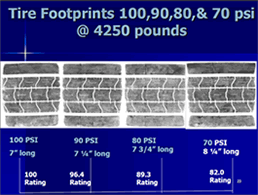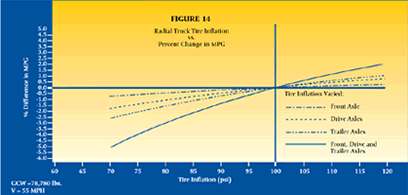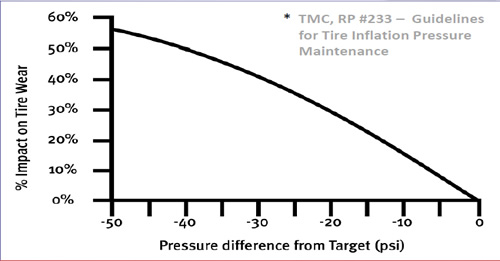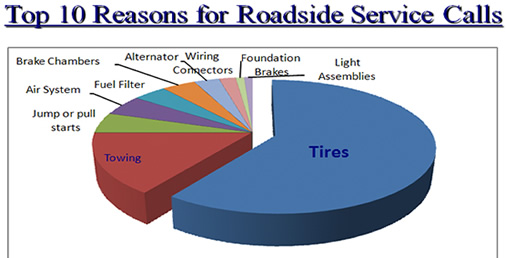

Tire failure results in 40,000 accidents, 33,000 injuries and over 650 deaths per year.
Valor TPMS monitors all tires in real time 24/7 for both air pressure and temperature. The driver or fleet manager sees the actual pressure and temperature readings in real time. The system will give immediate warnings for low pressure (critical under-inflation), high pressure ( critical over-inflation), fast leak, slow leak as well as critical over-temperature.
Tire rolling resistance (RR) (also called tire drag) is the force a tire must overcome to roll. It acts opposite to the direction of tire travel. The most important factor that affects RR is tire footprint. (Other factors are speed,vehicle alignment,etc). The more footprint is, the more RR.
Under-inflated tire has bigger footprint comparing to properly inflated tire. And thus has bigger deformation and recovery cycle as tire rotates under the load of the truck. This causes more rolling resistance and reduces fuel efficiency.

The above is part of a report from Clemson University Tire Conference 2010. It exhibits the result of the test done by STL (Standards Testing Laboratories). it shows that a tire with 70PSI air pressure has 18% more footprint than with 100 PSI.

This Goodyear Fuel Economy Model Prediction Charts shows that,on a typical truck at 55 MPH speed, 20% percent under- inflation of tires results in about a 3 percent decrease in fuel efficiency.
--- from Goodyear Radial Truck Tire And Retread Service Manual
An underinflated or overloaded tire can cause separations, circumferential breaks, uneven/irregular wear. It will also build up more heat that could go beyond the endurance limits of the rubber and radial cords. This could cause sudden tire failure.

Overinflation, on the other hand, will reduce the tire’s contact area with the road, which reduces traction, braking ability and handling. A tire that is overinflated for the weight it is carrying, is more prone to a harsh ride, uneven tire wear and impact damage.
Tests conducted by Goodyear have shown that just 15 percent underinflation of steer, drive and trailer tires results in about an 8 percent drop in expected tread mileage.
Casing shape and stress distribution are critical to both fuel economy and retreadability. That’s one reason correct inflation pressure is so important with any tire, but especially with fuel-efficient radials. It is not the tire, but the air inside it that supports the load. And, it is the air inside the casing that keeps that casing the right shape. So, proper inflation pressure for a given tire size and load is critical to maintaining proper stress distribution in the tire. This in turn reduces flexing and heat build-up that can waste fuel and shorten casing life.
Sidewall flexing increases noticeably when a tire’s inflation drops 15 to 20 percent below recommended. Excessive flexing can result in cord fatigue and broken cords. The potential for a sidewall rupture then becomes very great. Underinflation is also detrimental to your tires’ potential for multiple retreads. This is of special concern since today’s radial tires are capable of running much longer than the life of their original treads.
76% of all roadside repair calls involve tires, and over 83% of the time the problem causing the call is low tire pressure. Improper inflation is responsible for approximately 1 road call per year, per truck, thanks to prematurely weakened and worn tires. A tire pressure monitoring system will monitor your tires all the time and help you to keep your tire properly inflated. Thus reduce the downtime and save operation cost.
From Clemson University Tire Conference 2010.

With Valor TPMS the fleet has the capability to receive in real time, or download, store and analyze tire data collected. This gives fleet a tool to proactively manage their tires, as well as to encourage the drivers to participate corporate tire management program.
U.S. Enviromental Protection Agency estimated that for every gallon of diesel fuel, it produces 22.2 pounds CO2
When investing in a Tire Pressure Monitoring System, or for that matter, any technology or equipment for your fleet it is prudent to calculate and understand the Return on Investment.
At Valor we believe that our system does provide a significant return on the investment monetarily, but more importantly in improved safety for the operator, but in the end you need to be the judge.
To truly realize the maximum benefits of the system, we believe, that you first need to take into consideration the non monetary benefits.
Valor TPMS will provide the operator with critical information regarding the actual pressure and temperature in each tire in “real time “.
Tires operating at the correct pressure will….
As professionals working in the industry we all have heard the following…
“20% under-inflation reduces tire tread life by 25% “
“20% under-inflation reduces fuel economy by 2% “
“90% of tire failures are as a result of under-inflation”
“Almost half (49%) of all road side assistance calls are tire related”
While all of the above are true most companies have programs in place to check tire pressure, and CSA mandates that tire pressure be checked, so it is highly unlikely that your fleet is running low pressure on all or most of your tires for significant periods of time.
The monetary benefits of the Valor TPMS is a result of the ability of the system to alert the driver, or the fleet manager, in real time of pending issues. This comes from the Valor TPMS’s ability to look for and alert the operator to leaks and temperature increases in tires. These two issues are the predictor of tire failure.
If we can predict a tire failure we can prevent it, or at the least minimize the costs and downtime to the operator and company. By alerting the driver to the issue early the driver can take measures to minimize the cost by avoiding a roadside service call or destroying the tire.
At Valor we believe that every fleet, large or small, is unique in both its operational environment and maintenance programs. To truly get an accurate ROI for your operation Valor personnel would be pleased to review your operations with you and provide a personalized ROI that would be both measureable and achievable.
For more information or to schedule a fleet review please contact Valor at sales@valortpms.com.